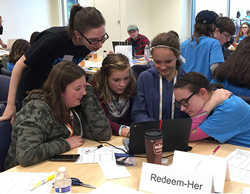The Monmouth University Department of Computer Science & Software Engineering, in conjunction with Random Hacks of Kindness Junior (RHoKJr), a non-profit that encourages a positive impact for technology use in other non-profits, hosted its first “Kids Coding for a Cause” event on Oct. 28.
This event welcomed over 50 young girls to the University to work on various projects. The point of the event was for these young girls, ranging from 4th-8th grade, to design, create, and test app prototypes for local non-profits.
The girls were given the opportunity not only to gain experience using the open source coding tool, MIT App Inventor, but they were also given the opportunity to learn how to effectively communicate with a client (the non-profit) and deduce project requirements. This is an invaluable experience that these girls will move forward with in their future careers having learned at such a young age.
Allowing budding female students to experience the immeasurable opportunities that the Science, Technology, Engineering, and Mathematics (STEM) field has to offer is pivotal in the era that we live in. STEM is a hugely important part of our society and there is a massive shortage of women in this field.
Megan Rapach, a senior software engineering student, said, “I had no exposure to coding before college. If I did, I feel like I would have had more confidence going into my freshman year at Monmouth.”
According to the National Center for Women and Information Technology, 1.1 million U.S. computing-related job openings are expected by the year 2024 and, as of 2016, women held only 26 percent of professional computing occupations. This number is abysmal and Monmouth University’s Computer Science & Software Engineering Department is facing this issue head-on.
Specialist professor of computer science and software engineering, Katie Gatto, said, “A fair representation for women of all kinds in STEM fields is essential, both to the advancement of science and our culture.”
The department has been proactive in getting more females involved in the field and, furthermore, it has worked on retaining the females it does attract to the field. Along with this event, the department has also sent eight women/men to the Grace Hopper Celebration of Women in Computing for the past few years, hosts a High School Programming Contest, and hosts as many programs they possibly can for young girls interested in technology similar to Kids Coding for a Cause.
Gaining the interest of girls is an issue due to gender stereotyping and judgement; however, an even bigger issue is the retention of girls who do get involved. Women in the field are targets for harsh criticisms and for the amplifications of their own insecurities.
Jessica Zemartis, a junior software engineering student, explained Imposter Syndrome, which is having low confidence and high personal standards: “As one of the few women in my classes, it can be difficult to feel singled out, whether it is in a positive or negative manner.”
She continued, “At times, it feels as though your personal work, achievements and failures are extrapolated into becoming representative of all women. The drive to prove that women are just as capable and belong in the field as much as anyone else can be a heavy weight to carry.”
Through the opportunity that she received through attending the Grace Hopper Celebration, Zemartis realized that one of the biggest issues that women experience in the field is insecurity: “The biggest barrier to my success would be myself if I didn’t truly embrace my skills, experiences, and passions.”
Giving girls like those who attended the RHoK, Kids Coding for a Cause event the opportunity to feel truly empowered being surrounded by other females interested in the field their own age is a priceless opportunity that, hopefully, will grow with them through their educational journeys.
Chair of Computer Science & Software Engineering, Jamie Kretsch, said in regard to running events such as Kids Coding for a Cause, “[this is] a huge step toward building an ‘I can code!’ confidence in these young women— something essential given the current inequality in the computing workforce.”
Women are often discouraged to enter the STEM field by men, but also by other women who consider the field a man’s field. The Computer Science & Software Engineering Department at the University is working to change the tide of the ocean of STEM to be inclusive of all genders one young female at a time.
PHOTO COURTESY of Teri Colella




